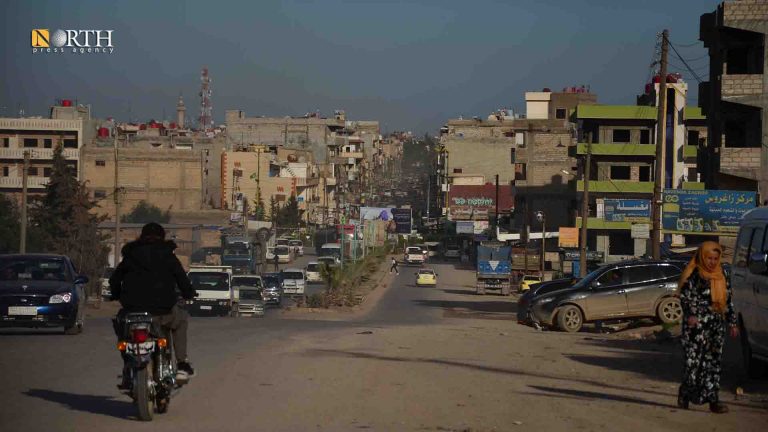QAMISHLI, Syria (North Press) – Raman Darwish, 28, who displaced from Sere Kaniye (Ras al-Ain) has not seen his father or siblings for two months although they live in the same neighborhood in the city of Qamishli, northeast Syria, as he is forced to do two jobs that last 15 hours every day in order to provide for his own family.
Raman displaced from his hometown, Sere Kaniye (Ras al-Ain), following the Turkish invasion. He lives in a flat he rented in al-Gharbiyah neighborhood in Qamishli city.
Low wages
The Turkish attacks on the border area between Sere Kaniye and Tel Abyad on October 9, 2019 displaced around 300,000 civilians, some of whom sheltered in squatter camps and the other resided in towns and cities northeast Syria.
Those who preferred to displace to the cities, suffer from inflation and extreme difficulty in renting houses as their prices keep growing. Therefore, they are forced to have two jobs or work two shifts in the same job in order to be able to provide a sustainable income.
Their situation is not very different from those who displaced to the camps given that the humanitarian aids are decreasing.
Apart from his job as an employee in Rojava University in Qamishli for seven hours, Darwish also works as a cashier in a shopping center for eight hours every day.
“I only see my two little girls while they are sleeping because I go to university in the morning and I come back from the shopping center in the evening,” Darwish said.
“All what I earn is 260,000 SYP from the university and 250,000 SYP from the shopping center per month (about $145 in total). That is too little to buy milk for my girls, pay the house’s rent and provide for my family,” he complained.
Sharing income
Bangin Hussein Ammo, 29, another displaced, who is married and shares a rented house with his brother’s family in al-Arbawiyah neighborhood to be able to pay every month 150,000 SYP (about $40) as a rent.
Ammo commutes to his job in a hair salon with his brother after he finishes his job as an employee in an institution run by the Autonomous Administration.
“I spent all the money I had saved in my hometown during the first months of displacement,” Ammo said.
Both Ammo and his brother have to do two jobs to be able to have sustainable livelihood.
Since the beginning of the Syrian conflict in 2011, large numbers of IDPs from different parts of Syria settled in Qamishli owing to the security and job opportunities available in addition to a limited presence of Syrian government forces.
Khalil Muslim, 32, a father of three, also has to do two jobs. He finishes his work in an institution run by the Autonomous Administration and then works as a power lineman every day.
He displaced with his family to Qamishli following the Turkish attack with only 400,000 SYP in his pocket.
“I could not afford for a rent or provide for my family given that we lost everything in the bombardment,” he added.
A while later, he found a house with 150,000 SYP monthly rent. Then, he started searching for a job.
“At first, we faced many challenges and we hoped to go back to our hometown. Afterwards we realized our staying in Qamishli will take longer so I started searching for a second job to increase my budget,” he noted.
Absent assistance
Muslim and other displaced people assure to North Press they received no relief aids from the Autonomous Administration; all the humanitarian aids go to the people living in the camps.
“Running the affairs of the displaced and the refugees in Jazira region is our top priority. We hire in our institutions, in the first place, the displaced people since we are obliged to find them job opportunities,” Hidreen Sino, co-chair of the Social Affairs and Labor Board, stated.
Sino pointed that they kept in service all the displaced employees who were already appointed by the Autonomous Administration in their hometown.
However, the IDPs complain salaries the Autonomous Administration do not cover expenses of the rents which some may amount to $100 per month.
Reporting by Judy Muhammad
Editing by Rebar Jaziri

